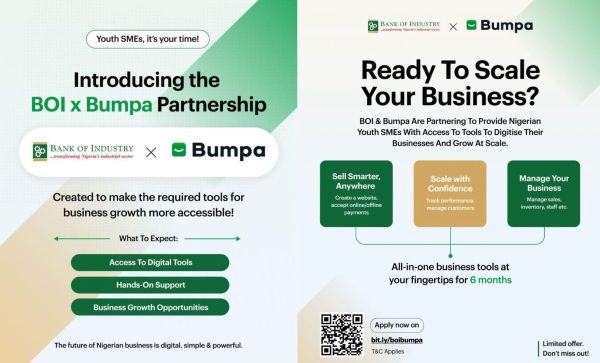BoI, Bumpa Partner to Digitally Empower 200 Youth-Owned MSMEs Across Nigeria

A new blueprint for inclusive growth and youth enterprise transformation in Africa’s largest economy
In a decisive move to accelerate Nigeria’s digital economy and empower its next generation of entrepreneurs, the Bank of Industry (BoI) has entered into a strategic partnership with Bumpa, one of Africa’s leading digital commerce platforms. The collaboration will empower 200 youth-owned Micro, Small, and Medium Enterprises (MSMEs) across the country with the tools, training, and access they need to compete and thrive in the digital age.
According to Dr. Olasupo Olusi, Managing Director of the Bank of Industry, the partnership aligns with BoI’s Youth and Skills Development Agenda — a core pillar of its national economic inclusion strategy aimed at enabling Nigerian youth and Youth-Owned MSMEs to transition from survival-mode enterprises to scalable, technology-driven ventures.
“We are bridging the digital divide for young business owners. This partnership will equip them not just with skills, but with systems that empower growth, accountability, and visibility in today’s connected world,” Olusi said in a statement from Lagos on Sunday.
A Digital Lifeline for Youth Entrepreneurs
At the heart of the BoI–Bumpa initiative lies a shared mission: to digitally transform Nigeria’s youth-led businesses by helping them automate operations, improve financial management, and reach new customers through mobile technology and e-commerce integration by empowering.
Olusi noted that most micro and small enterprises still rely on manual bookkeeping and offline sales methods, which limit their capacity to scale or qualify for credit and investment.
Through this partnership, selected youth entrepreneurs will gain six months of free access to Bumpa’s full suite of business management tools, including online store creation, inventory tracking, digital payments, and data analytics dashboards.
“This is about creating pathways from informality to formality — enabling small business owners to move from notebooks to the cloud, and from roadside sales to global markets,” Olusi explained.
Bridging the Access Gap: From Local Hustle to Global Market
Access to markets remains one of the most significant barriers for Nigerian MSMEs — a challenge this initiative directly targets.
Through Bumpa’s digital platform, beneficiaries will be able to create and manage online stores, integrate multi-currency payment options for cross-border transactions, and engage customers through bulk SMS, email marketing, and social media integrations.
These digital tools will not only enhance visibility but also provide critical business performance analytics — allowing entrepreneurs to track sales, monitor inventory levels, and forecast demand in real time.
Olusi described the intervention as a “market access multiplier”, saying it would connect local innovators to global consumers, investors, and supply chains.
“Innovation can no longer thrive in isolation,” he said. “By digitizing these businesses, we are plugging them into value chains that extend beyond Nigeria’s borders.”
Empowering Through Inclusion and Technology
The initiative is also part of BoI’s broader mission to bridge the structural and financial gaps that have historically limited the growth of youth enterprises in Nigeria.
By combining capacity building, financial inclusion, and digital infrastructure, the partnership seeks to redefine what sustainability means for Africa’s informal economy.
Bumpa’s intuitive mobile platform, already used by thousands of small business owners across Africa, allows users to handle sales, invoicing, customer relations, and logistics all in one place — providing the kind of operational efficiency once reserved for larger corporations.
Olusi emphasized that the partnership reflects BoI’s long-term vision to build an economy where “youth and technology co-create value.”
He added that digital literacy is no longer optional — it is the new currency of global competitiveness.
The Economic Context: Why This Partnership Matters
Nigeria’s MSME sector, according to the SMEDAN/NBS 2022 Survey, contributes nearly 50% of GDP and employs over 84% of the nation’s workforce. Yet, over 70% of these businesses remain informal, with limited access to credit, digital tools, or markets.
Experts say that unless this productivity gap is addressed, Nigeria’s ambitions for a $1 trillion economy by the end of the decade could stall.
The BoI–Bumpa collaboration, therefore, represents more than a pilot project — it is a proof of concept for how digital inclusion and youth empowerment can drive structural transformation.
“When young entrepreneurs have access to data, technology, and mentorship, they don’t just build businesses — they build resilience into the economy,” said an international development economist who spoke to BRANDECONOMY.
BoI’s Expanding Digital and Development Footprint
This initiative adds to a growing list of BoI-led programs designed to democratize access to finance and strengthen the foundation of Nigeria’s digital economy.
Under Dr. Olusi’s leadership, BoI has intensified partnerships with tech startups, fintech enablers, and innovation hubs, while promoting green manufacturing, agritech, and creative industries as growth engines.
Bumpa, for its part, has gained recognition across the continent for transforming small-scale trading through its mobile-first e-commerce tools, allowing merchants to sell online with minimal setup time.
The synergy between both organizations underscores a shared belief — that youth enterprise is the most powerful catalyst for inclusive national development.
From Lagos to the World: The Next Generation of Nigerian Entrepreneurs
For the 200 selected beneficiaries, this partnership will serve as a digital springboard — helping them move from micro survival to sustainable enterprise.
Beyond tools and training, they will gain access to a network of mentors, investors, and policy advocates committed to supporting their long-term growth.
Olusi concluded by reaffirming BoI’s mission:
“Every empowered young entrepreneur is one less unemployed youth. Every digitized business is a step closer to an inclusive, innovation-driven Nigeria.”












